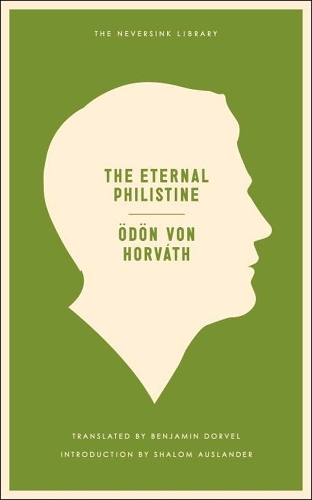
The Eternal Philistine
(Paperback)
Publishing Details
The Eternal Philistine
By (Author) Odon Von Horvath
Melville House Publishing
Melville House Publishing
15th April 2013
United States
Classifications
General
Fiction
833.912
Physical Properties
Paperback
192
Width 127mm, Height 230mm
198g
Description
A classic prescient work of pre-WWII literature by a major Weimar author about a young used car salesman. In search of another means to live the high life, he decides to travel from Berlin to Madrid to see the World's Fair - and hopefully meet a beautiful, rich woman who can provide for his every whim. The Eternal Philistine is a highly stylised and at times raucously funny tale of the almost absurd: a dark satiric look at Europe on the brink of Fascism, seen from all levels of society.
Reviews
PRAISE FOR DN VON HORVTH
"dn von Horvthwas a brilliant German writer. . . .He makes the truth irresistable."
Edmund Wilson
Horvth had turned his back on the mournful realism of the migrs, with their passion for easy caricature and their desire for revenge. He had realized with extraordinary acuteness that to meet the horror of reality with a horror literature was no lon- ger possible or useful; that the reality of Fascism was in fact so overwhelming and catastrophic that no realism, particularly the agonized naturalism of the twentieth century, could do it justice.
Alfred Kazin
The most gifted writer of his generation.
Stefan Zweig
Horvth is better than Brecht.
Peter Handke
One of the best Austrian writers ... In every line of his prose there is an unmistakable hatred for the kind of German philis- tinism that made the German murder, the Third Reich, possible.
Joseph Roth
The most gifted of the young dramatists, and above and beyond the brightest mind. . . .
Carl Zuckmayer
These works remain steps. But they lead to great heights.
Franz Werfel
Author Bio
" D N VON HORV TH (1901-1939) was born near Trieste, the son of a Hungarian diplomat who moved the family constantly. Horvath would subsequently say of himself, I am a melange of Old Austria; Hungarian, Croat, Czech, German; alas, nothing Se- mitic. Although his first language was Hungarian, he went to high school in Vienna and college in Munich, and began writing plays in German. Leaving school, he settled in Berlin, where in 1931 his play Italian Night debuted to rave reviews except from the Nazi press, which reviled him. His next play, Tales from the Vienna Woods, starring Peter Lorre, drew an even stronger, equally divided re- sponse. When the Nazis came to power in 1933 he relocated to Vienna, but on the day of the Anschluss March 13, 1938 he fled to Budapest. From there, he soon moved to Paris, but on June 1, 1938, he was killed in a freak accident when, caught in a rainstorm coming out of a theater on the Champs- lysees, he took shelter under a tree that was hit by lightning; von Horvath was struck by a falling tree limb and killed instantly. He was 36 years old and had published 21 plays and three novels The Age of the Fish, A Child of Our T
